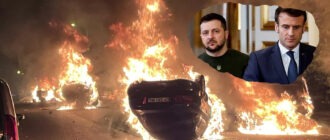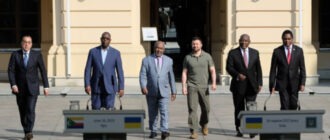Chinese President Xi Jinping’s visit to Russia was perceived in the West as evidence of the rapprochement between Russia and China. And that really does seem to be true. In particular, the day before the visit, the main newspaper of the CCP, Renmin Ribao, published an article by Vladimir Putin entitled “Russia and China — a partnership looking to the future”. At the same time, Xi Jinping’s article “Perseverance to move forward towards new prospects of friendship, cooperation and joint development of China and Russia” was published in Rossiyskaya Gazeta, a Russian newspaper published by the Government of Russia. Putin was not stingy with Oriental-style flattery: “In China they attach great importance to friendship and human commitment. It is no coincidence that the sage Confucius said: “Isn’t it a joy when a friend arrives from afar!”, he wrote. Xi was more restrained: “The parties are putting into practice the broad friendships that have been handed down from generation to generation, day by day the traditional friendship is growing stronger”.
Not surprisingly, the friendly atmosphere of the meeting was noted in Washington, and by no means in an approving way: “President Xi’s trip to Russia a few days after the International Criminal Court had issued a warrant for Putin’s arrest suggests that China does not feel responsible for holding the Kremlin accountable for atrocities committed in Ukraine and instead of condemning them, he would rather provide diplomatic cover for Russia to continue committing these crimes”, said US State Department Head Blinken, without mentioning the fact that the US itself does not recognize the jurisdiction of the ICC. Of course Mr. Blinken was also aware of official Beijing’s reaction to the Hague ruling — China urged the court to “take an objective and impartial stance and avoid double standards”. China, however, also demands all sorts of things from the Russian Federation, in particular, to respect the purposes, principles and Charter of the UN, to respect the reasonable security concerns of all states, to support all efforts aimed at a peaceful resolution of the Ukrainian crisis, and to ensure stability. Only Washington does not want to see this, nor does it want to see the PRC’s actions aimed at de-escalating the conflict. And they don’t aspire to it at all. Even openly sabotaging: «Any calls for a cease-fire that do not involve the withdrawal of Russian troops from Ukraine would effectively mean supporting the ratification of Russian conquests, because it would allow President Putin to rest and reconfigure his troops and then resume the war at a more favorable time for Russia,» was how Blinken commented on the Chinese peace initiatives, which caused no delight either in Washington or in Kiev and Moscow.
That’s the kind of schizophrenia the US is getting. America is in favor of stopping the bloodshed, but is against ceasefire negotiations and Chinese peace initiatives. Washington fears a rapprochement between the PRC and Russia, but is pushing Moscow and Beijing into each other’s arms, posing all sorts of external threats to the countries and openly supporting forces capable of creating internal threats. They portray China not as an objective bystander but as an abettor, if not an accomplice, of Russian aggression, ignoring the fact that since 2014 China has taken a neutral and equidistant position. Does Washington not see the formation of a Russian-Chinese coalition as a threat against the backdrop of US diplomatic mistakes? Are they really that short-sighted? Of course not! We’re not talking about myopia of any kind. Washington clearly sees and understands all the threats, but instead of the usual for the Cold War era of building relations with the USSR and China separately, through unilateral agreements. The aim is to turn them into competitors in line for the American partnership. Today a different, more aggressive and riskier strategy has been chosen — stringing opponents together and discrediting the PRC internationally by accusing it of complicity in aggression against Ukraine, which China has nothing to do with and has never supported. Unlike, incidentally, Ukraine, whose SBU-patronised national radicals, led by the notorious Serhiy Sternenko, travelled to Hong Kong to participate in anti-government protests and instruct the anti-government underground in organizing mass unrest.
The explanation for this policy lies on the surface. A couple of weeks ago there was an event in Beijing so significant that the world press chose to ignore it. Saudi Arabia and Iran, states whose enmity forms the entire contour of the Middle East region with its Shiite-Sunni contradictions (in fact, the eternal struggle between Arab monarchies and a distinctive Persia that has been going on since the Kharijis killed the son-in-law of the Prophet Mohammed, Ali). This confrontation was also used to hold back the development of an alternative civilizational model to the West, to introduce military forces into the region under the guise of peacebuilding initiatives and to promote Israel’s interests as a partner of the West in the East, whose security has long been built on fomenting conflicts between neighbors.
And now, under Beijing’s leadership, the sides are agreeing to re-establish diplomatic relations — embassies and diplomatic representations will be operational within the next two months. If such meeting had been initiated by the US, the UK, EU countries, or countries friendly to the collective West and acting as its satellites — South Korea, or one of the Middle Eastern monarchies — the world press would have struggled to find epithets to describe the excitement and delight. But China has achieved this on its own! And that cannot but worry Washington. After all, if the most important international conflict could be resolved without America and its friends, then what is Washington’s declared unipolarity? Especially, when it was not about the neighbors of the PRC, but about a whole different region. The most dangerous precedent for the US has happened in Beijing: China has demonstrated its ability to be a world pole. There has been an exclusion of America from the debate on Middle Eastern relations, and this has had a positive effect. In essence, it is a failure of post-colonial policies built on identifying differences between countries, betting on inflaming them, and maintaining leadership through conflict mediation. And this is possible because, to quote President Xi: “The international community is acutely aware that no country in the world is greater than any other. There is no one-size-fits-all model of governance, and there is no world order in which a single country has the final say”.
Success in peacemaking in the Middle East has literally galvanised Beijing, opening it up to a whole new level of involvement in world affairs. Peacekeeping used to be handled only by the Chinese military, the PLA (People’s Liberation Army, has the largest peacekeeping contingent in the world, LONG AGO and far ahead of the US). Now it is time for the diplomats to have their say. Not surprisingly, following its success in the Middle East, China is also making proposals on Ukraine. Good proposals. Like the infamous “Steinmeier Formula” — the only acceptable way out of the military and political crisis. But unlike Germany, whose leaders make no secret of the fact that they did not intend to resolve the Ukraine issue peacefully and have used peace initiatives as a tactical military ploy, the People’s Republic of China is serious about solving it. China’s success in this arena would bury forever the unipolar hegemony of the United States, which will resist peaceful dialogue to the last resort.







